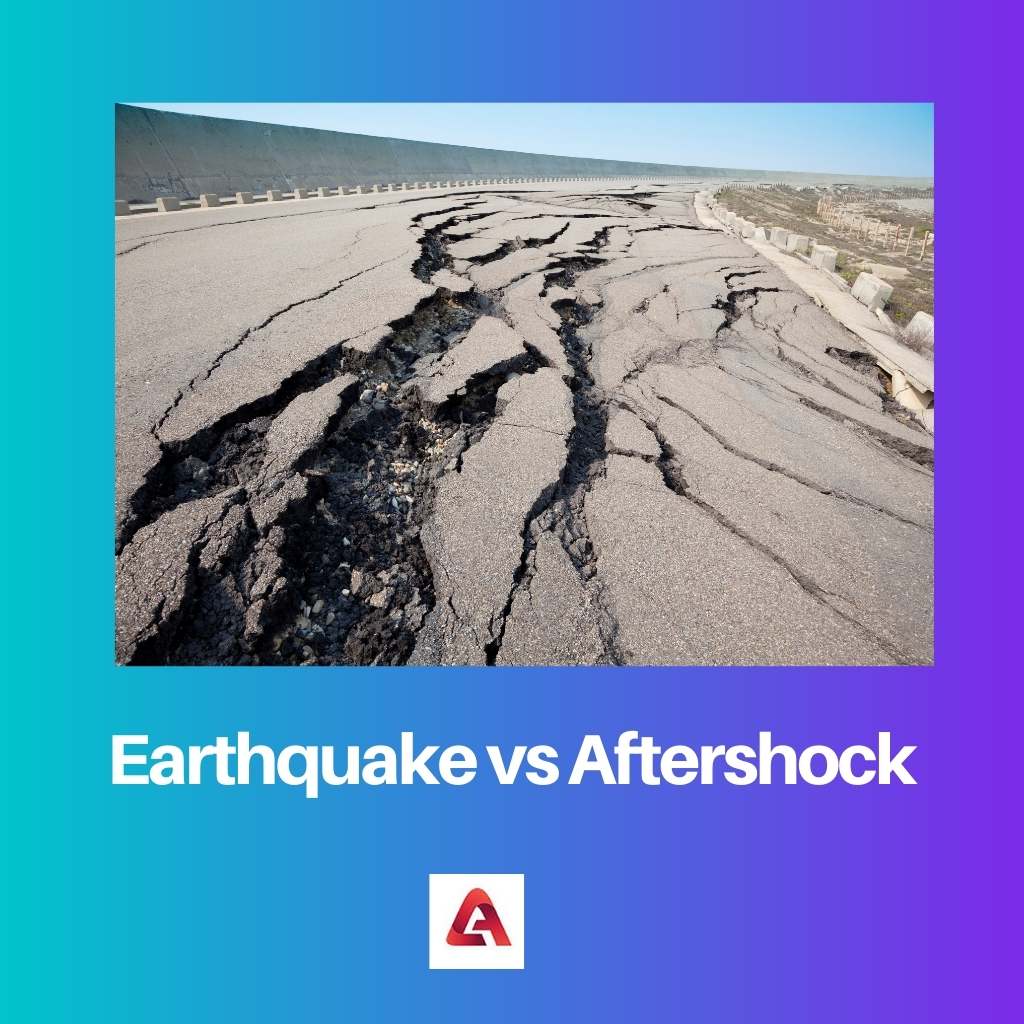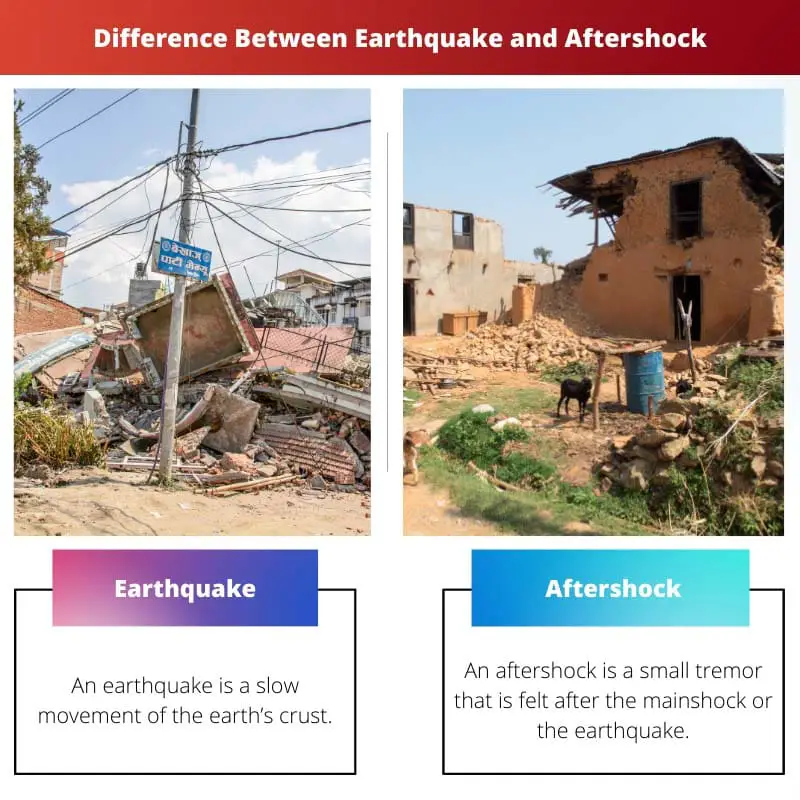People get confused as to what is an earthquake and an aftershock, and they may be used interchangeably.
Earthquake and aftershock are relative terms. Generally, the aftershocks represent minor adjustments at the time of the earthquake or a foreshock.
The earthquakes and the aftershocks depend on the magnitude of each. Historically, deep earthquakes are less likely to be followed by an aftershock than shallow earthquakes.
Key Takeaways
- An earthquake is a seismic event that occurs when there is a sudden release of energy in the Earth’s crust, while an aftershock is a smaller earthquake that occurs after a larger earthquake in the same region.
- Earthquakes can cause extensive damage and loss of life, while aftershocks can hinder rescue and recovery efforts.
- Aftershocks can continue for days or weeks after the initial earthquake, while earthquakes can occur anytime and without warning.
Earthquake vs Aftershock
The difference between an earthquake and an aftershock is that earthquake is known as a mainshock. They are more powerful and long-lasting. The magnitude of an earthquake is stronger, whereas aftershocks come after the earthquakes and are less powerful than earthquakes, the magnitude of an aftershock is lower.

Earthquakes are high-magnitude natural calamities that bring great devastation. They happen when friction occurs, which then causes the slow movement of the tectonic plates.
Places that are located near the tectonic plates are known to have more quakes than places that are far off.
The small tremors that are felt after the mainshock is called an aftershock. An aftershock is considered a smaller earthquake. They are of lower magnitude than earthquakes. An earthquake is a sign that an aftershock will happen.
Comparison Table
| Parameters of Comparison | Earthquake | Aftershock |
|---|---|---|
| What is it | An earthquake is a slow movement of the earth’s crust. | An aftershock is a small tremor that is felt after the mainshock or the earthquake. |
| Causes of occurrence | An earthquake happens because of the slow movement of the earth’s crust. They can happen due to man-made activities like mining, nuclear blasts, etc. | Aftershocks happen when the earth’s crust fixes itself after the tremor. |
| Duration | The earthquake can last about 4 minutes. | The lasting of the aftershocks depends on the magnitude of the earthquake, generally, they last for a few hours, but they can last for up to months. |
| Magnitude | The earthquake has a higher magnitude than an aftershock. | An aftershock has a lower magnitude than an earthquake. |
| Certainty | Earthquake is difficult to predict. It can happen anywhere. | Aftershocks come after the mainshocks, so it is easy to predict. |
| Destruction caused | Earthquake of higher magnitude causes high destruction. | As aftershocks have a lower magnitude so there is no damage or very little damage. |
What is Earthquake?
An earthquake is a movement of the earth’s crust. An earthquake happens when friction happens in the earth’s crust leading to a crack in the crust.
The slow and steady movement of the tectonic plates causes earthquakes. Places located near the tectonic plates are known to have more earthquakes than places far from the tectonic plates.
In earthquakes, the pressure that is released radiates out, and these waves cause the ground to shake.
Sometimes, due to the vibrations, man-made objects are damaged depending on the magnitude of the quake and cause volcanic eruptions or tsunamis.
An earthquake is the main shock that can be felt. They may come in different strengths. The higher the strength, the more damage will happen.
The magnitude of an earthquake is measured through the Richter magnitude scale. The earthquakes last up to a few minutes.
An earthquake is a sudden tremor that comes without any warning. They can be a result of some of mankind’s activities like mining, nuclear testing, etc. The earthquakes cannot be predicted.

What is Aftershock?
An aftershock is a smaller-magnitude earthquake. The more frequent the earthquake is, the more frequent the aftershocks are. Aftershocks can even happen on a regular basis after the earthquakes.
They are mainly of lower magnitude than earthquakes. If the aftershock has a higher magnitude than the previous shock, then it is referred to as the main shock, and the previous shock is called a foreshock.
They cause no damage or less damage than earthquakes. People expect aftershocks after the quack with a higher magnitude.
Depending on the earthquake, they happen in the first few minutes of the mainshock. The magnitude of the aftershocks also depends on the magnitude of the earthquake or the mainshock.
Generally, aftershocks are of the same nature as earthquakes or mainshocks, but they are not as strong as the quakes and do not cause much damage.
The frequency of the aftershocks decreases with time.

Main Differences Between Earthquakes and Aftershocks
- The magnitude of the earthquake is much stronger than the aftershock.
- An earthquake of higher destruction causes higher destruction, and whereas aftershocks are of low magnitude, they cause little or no damage.
- An earthquake happens due to the movement of the tectonic plates, whereas aftershocks happen as the earth’s crust adjusts itself.
- The aftershocks within a few hours of the mainshock follow an earthquake.
- If the aftershock is stronger than the earthquake, the aftershock is renamed the mainshock, and the earthquake is reamed as the foreshock.
- No one can predict an earthquake, whereas an aftershock can be predicted as they always come after the mainshock or the earthquake.
- An earthquake happens around places near the tectonic plates, whereas aftershocks happen after the earthquake.

- https://www.jstage.jst.go.jp/article/jpe1952/4/2/4_2_63/_article/-char/ja/
- https://ascelibrary.org/doi/abs/10.1061/(ASCE)ST.1943-541X.0001019

Great information, really enjoyed reading this article.
Very informative, thank you!
The in-depth explanations provided in this article were interesting, I appreciate the clarity of the information.
This was a good read, thank you.
I found the comparison to be quite helpful for understanding the differences between an earthquake and an aftershock.
The comparison table was particularly interesting, however, the destructive power of aftershocks may have been undersold. Aftershocks can be devastating for damaged structures and property, and they are overlooked in emergency preparedness plans.
I understand your perspective. The article could definitely expand on that aspect.
You raise a good point, aftershocks indeed need to be taken more seriously.